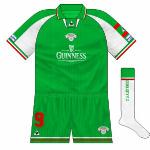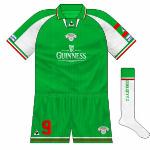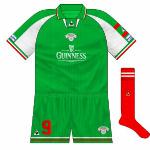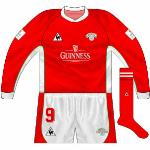
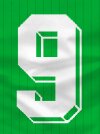
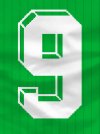
The summer of 2002 brought a number of changes to the eircom League, and Cork City in particular. The coming season would be the first to feature the long-heralded 'summer soccer', though with the July start it would mean that the end of the season protruded into 2003, with the following campaign to first to be fully housed within a calendar year. The collapse of ITV Digital, and the knock-on financial effects at lower-league English clubs, also meant that more young Irish players were returning home from abroad, and in this regard City benefited from the signings of John O'Flynn from Peterborough United and George O'Callaghan (Port Vale). Mdfielder Alan Reynolds and Billy Woods were other positive signings and youngsters Dave Warren, Michael Mulconry and Alan Bennett were all being given their chance. A notable departure was winger Ollie Cahill after six years, the Tipperary man joining Shelbourne, though he would be back at Turner's Cross before too long.
Visually, the big change came in the home kit, which had been changed upon the orders of new owner and chairman Brian Lennox. Green was now the dominant colour for the first time (ignoring the 'Ireland' kit worn in Shanghai in 1991), with the green shorts and white socks making City look like a green Chelsea (left). Overall, it was an attractive kit, though the red trim on the left sleeve might have been better if it had been symmetrical. The Evening Echo also returned as a sleeve sponsor.
Typically, the randomness of the fixture list meant that Shelbourne and Cahill were City's first opponents of the new season on July 5. The optimism regarding the new season and the new-look side resulted in a crowd of around 6,000 at Turner's Cross and they were not disappointed, O'Flynn scoring twice and O'Callaghan getting the other in a 3-0 win. Unfortunately, it did not set in train an inexorable march towards the title and instead it would prove to be an up-and-down season, the second match seeing a 4-1 reverse away to St Pat's before UCD were beaten 3-2, O'Flynn bagging another brace. Amazingly, the first round of fixtures saw City win all of their home matches but fail to triumph in any away games, and while that saw them just a point off second-placed Shels, Bohemians were a further 10 points clear athe top of the table.
With no long-sleeved shirts being worn even as the cold weather arrived in the autumn, the only real notable kit occurrence came in September when new shorts, with the (stupid) red number now next to the Le Coq Sportif logo (left) rather than above it as it had been. Another quirk came on the back of the shirts, with the a variation
of the number 9 (usually worn by O'Flynn - squad numbers would be introduced for the 2003 season) having the outline going in the wrong direction, essentially an upside down 6 (far left, with the 'proper' one next to it). For the trip to the Brandywell to face Derry City in October, a clash with the home side's white socks meant that City had to change, but rather than having a specialised green set to use, the red ones from the previous home were used (right), which jarred slighly as it was a distant third in terms of colours used on the rest of the kit, the shorts numbers notwithstanding.
That game finished scoreless (Derry had beaten City 1-0 at the Cross in the FAI Cup semi-final), but the winless away run in the league finally ended in the Carlisle Grounds at the end of the month, O'Callaghan, Woods and new defender Dan Murray getting the goals in a 3-2 win over Bray Wanderers. That win briefly put City into second before Shels won two days later, with the old red
home kit being worn as the away strip now (below right), also getting a run-out a fortnight later away to Shamrock Rovers, a 4-1 defeat which more or less ended any faint hopes of overhauling Bohs' lead at the top.
Just in case there was any doubt, a home draw with Longford and a loss to UCD at Belfield underlined the fact, though there was a recovery of sorts with home wins over Shels and Derry. Rovers had made a burst up the table in the latter part of the season, however, and defeats in the final two league games, away to St Pat's and at home to UCD, meant that City finished in a disappointing fourth place at the end of the season. Fourth would prove to be the first step of an incremental progression though, with the next three seasons seeing City improve on the previous campaign.



